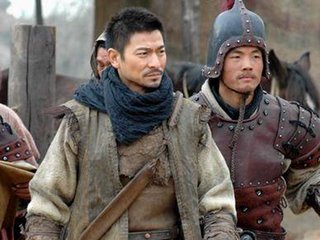
Director: Jacob Cheung
Starring: Andy Lau, Ahn Sung-ki, Wang Zhiwen, Fan Bingbing, Wu Chi-lung, Choi Si-won
RunTime: 132 mins
Genre: Period Drama
Rating: PG (Some Battle Scenes)
(This entry is contributed by my colleague Patrick.)
It’s undeniable that A Battle of Wits is an extravaganza and along with this term, there inadvertently exists the social stigma of elaborate costumes and special effects, coupled with poor storyline and acting to boot.
While I agree that the film does boast an international cast such as Hong Kong actor Andy Lau, Korean talent Sung-Kee Ahn and China budding actress Fan Bing Bing, “A Battle of Wits” also has very deep political overtones, which I will attribute it to the director Jacob Cheung’s ambitious aspirations to pass his messages to the world through the world of cinema.
The plot also proves to be quite unique. Given that a small kingdom of Liang is under siege from a large army of Zhao, the ruler of Liang has requested assistance from a group of strategists, know as The Mozi. Just before the start of battle between the two parties with the Liang army on the verge of surrender, a lone figure was spotted trekking across the harsh desert terrain right up to the castle of Liang. His name is Ge Li (Andy Lau), a member of the Mozi clan. And with his appearance and subsequent intervention, the tide of battle is turned.
What makes A Battle of Wits so distinctive and impactful are the social messages that it conveys. The characters in the film are not mere caricatures, and each of them seeks to pass a message to the audience. It’s been sometime since characterisation surpasses storytelling in filmmaking. But this film proves the point that film characters are still the best option to push the story forward, along with the narrative.
The film’s anti-war message is prominent throughout this 132-minute film, portraying the consequences of war well: death, destruction, loss of loved ones, orphaned children, betrayal, love for power, biased justification for war and loyalty. The film also prominently and unabashedly displays human’s lust for dominance and destruction at the cost of human lives, and openly exhibits human’s unfathomable acceptance for sacrifices as well as the unacceptable lengths that they will go to achieve their personal ambitions over world peace.
A Battle of Wits also illustrates the fact that the world is often divided into two halves of good and evil. Whenever an evil tyrant stays in power, the good individuals are often suppressed and oppressed in a world where justice seldom prevails. The film also offers a perspective that the loyalties of wandering travelers from a town to another ultimately lies in their personal gains.
What makes this film so eerily haunting is the fact that it almost always speaks true of our current times. If one were to go through the history of mankind in times of war or flip through the pages of any newspapers, one will find certain truths in these filmic messages.
But there’s another message that tries to break out of the movie. And that‘s the exploration into the psyche of human nature. The film delves deep into the heart of human nature and explores questions such as: Should all love one another? Should there be giving without receiving? Should people advocate peace instead of war? Should life be treasured rather than discounted?
Sadly, in the film, some characters long for revenge over redemption, pursue personal gains over self-sacrifice, chose war over peace and kill rather than forgive. The male lead Ge Li thereby acts as the lone messiah in the mist of power-hungry warlords, backstabbing court officials and victims of circumstances.
It seems to reflect the state of our current times, where goodness is often shrouded in dense darkness.
But what will send a chill down your spine after watching this film is its revelation of how complex and dark human nature can be.
A Battle of Wits - A Reflection of State

1 Responses to “A Battle of Wits 墨攻”
Leave a Reply
About me
Previous posts
Archives
- March 2005
- April 2005
- May 2005
- June 2005
- July 2005
- August 2005
- September 2005
- October 2005
- November 2005
- December 2005
- January 2006
- February 2006
- March 2006
- April 2006
- May 2006
- June 2006
- July 2006
- August 2006
- September 2006
- October 2006
- November 2006
- December 2006
- January 2007
- February 2007
- March 2007
- April 2007
- May 2007
- June 2007
- July 2007
- August 2007
- September 2007
- October 2007
- November 2007
- December 2007
- January 2008
- February 2008
- March 2008
- April 2008
- May 2008
- June 2008
- July 2008
- August 2008
- September 2008
- October 2008
- January 2009
good review, good read, thanks!